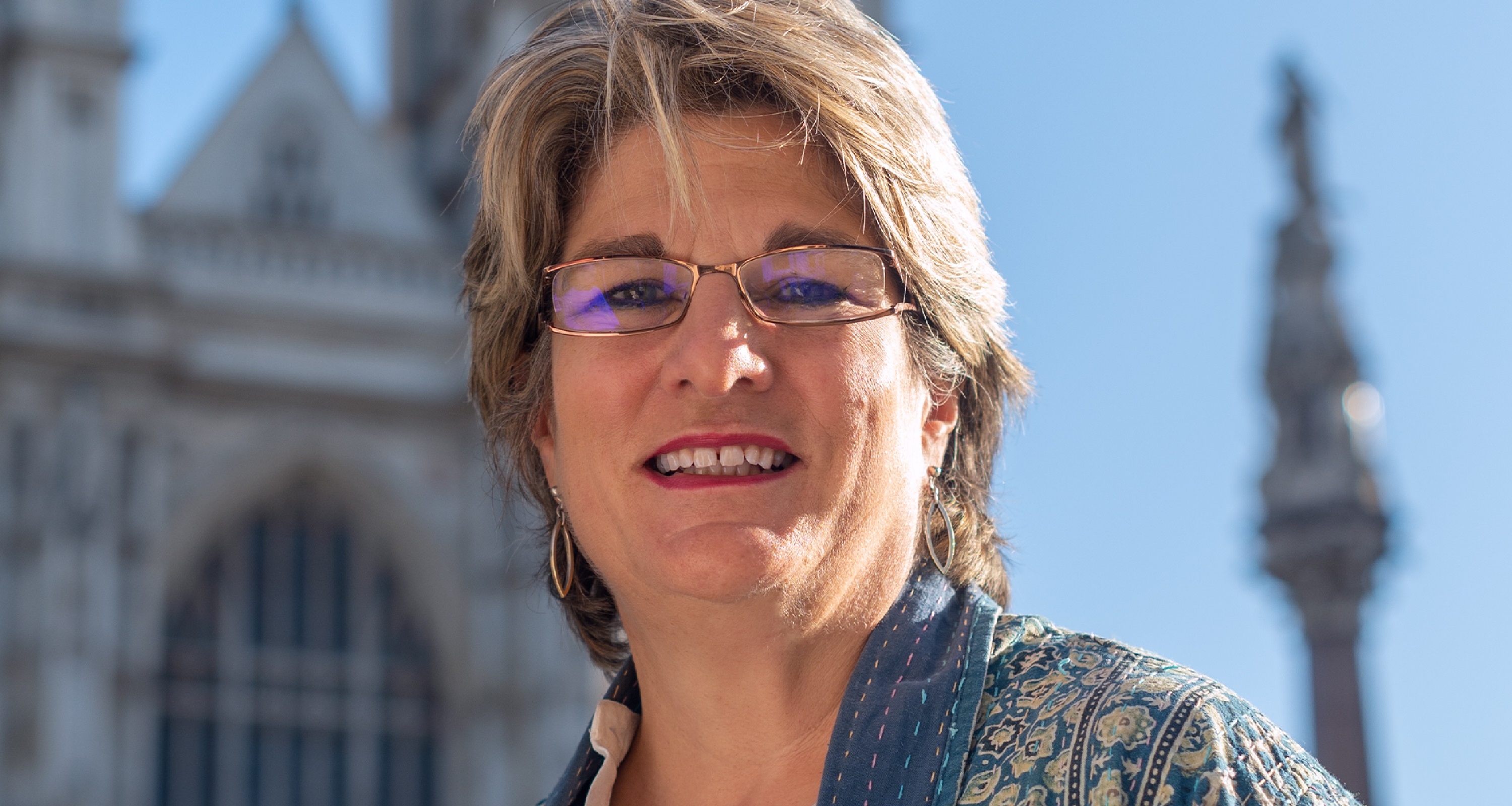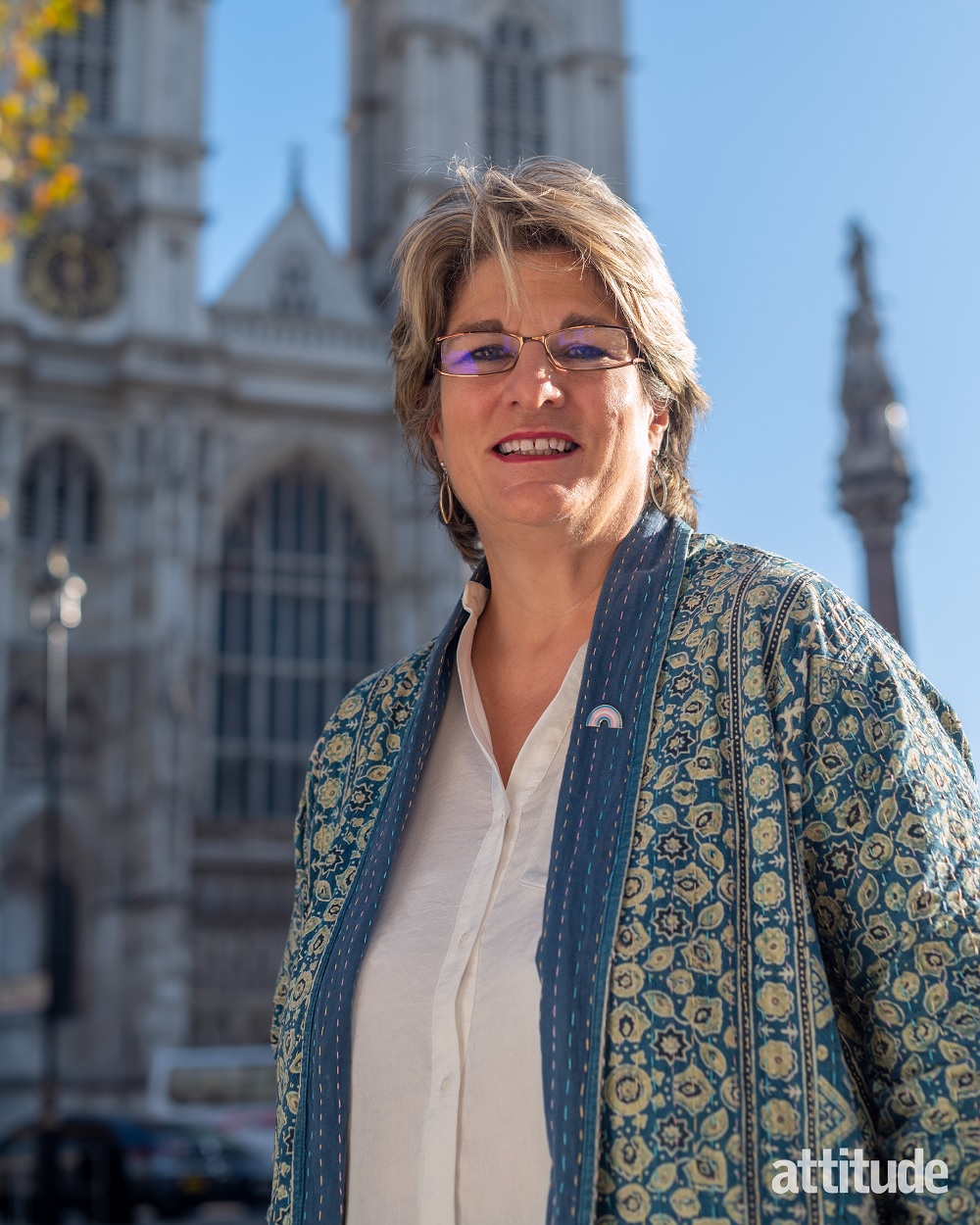‘I went through gay ‘conversion’ therapy for 20 years, which sadly took me twice to hospital’
High-profile evangelical Anglican Jayne Ozanne helped force Boris Johnson's hand on a gay 'conversion' therapy ban. She leads the Attitude 101 Politics category.

Words: Jamie Tabberer; pictures: Markus Bidaux
In this year of political polarisation and sleaze, it’s interesting to note the influence that those operating outside Westminster can exert. Prominent LGBTQ+ evangelical Anglican Jayne Ozanne is a case in point. She leads the Politics category in the Attitude 101 issue – out now to download and to order globally.
In March, the 53-year-old forced the government’s hand on a long-delayed ban on the insidious, scientifically debunked practice of ‘conversion therapy’ — which seeks to change or suppress a person’s sexuality or gender — by quitting the government’s since-disbanded LGBT+ advisory panel over the issue.
Her experience of government on the panel of unpaid volunteers was a tale of two halves: “Excellent, engaged, positive, a sense of ‘wow!’” under ex-Women and Equalities Minister Penny Mordaunt; then “a change of guard” under Liz Truss.
“To be fair, Liz Truss did meet with us on Zoom during the pandemic,” says Jayne. “But we didn’t have consistent meetings; the action plan was put to one side. It felt like hitting our heads against a brick wall. We’d write letters, wouldn’t get responses.”
When Jayne quit, others followed; she became the face of the moment after an ITV News interview in which she slammed the “hostile environment for LGBT people among this administration”, calling Truss and fellow equalities minister Kemi Badenoch “ministers for inequality,” adding: “I don’t believe that they understand LGBT people, particularly transgender people.”
Nine months later, gay Tory MP Mike Freer is in place as equalities minister, while Lord Nick Herbert has been appointed by Boris Johnson as Special Envoy on LGBT Rights. Furthermore, a ‘conversion therapy’ ban (of one ambiguous form or another; more later) is planned for 2022 following a public consultation.

Photography: Markus Bidaux
Although Jayne isn’t solely responsible for these developments, her influence is clear. “Part of the reason I quit was to get the message to [Johnson]: things needed to change,” she admits.
Speaking to Attitude in a centuries-old, wood-panelled room near Westminster Abbey, Jayne reflects on a deeply personal crusade. “I spent 40 years struggling with my faith and sexuality and went through ‘conversion therapy’ for 20 years, which sadly took me twice to hospital,” she recalls. “Two full-blown breakdowns took me to a dark place of wondering if I should carry on.”
Jayne, in need of discretion, given her senior position within the Church of England as a member of the Archbishops’ Council from 1999-2004, paid thousands for spiritual counselling and exorcisms. “I even went to Germany for a course,” she remembers.
She was also once hit with a Bible. “The guy thought I had a demon. I was violently sick a few times. They expected it – they’d whip out a bucket from nowhere. Increasingly, you hear stories of women subjected to forced rape. Research shows that violence, particularly towards our trans friends, is commonplace.”
Most therapies, says Jayne, are subtle: “On a Sunday, in prayer group. When you find that doesn’t work, you reach out to specialist ministers, organised events.” Her experiences of overt and covert therapies informed her disappointment in the government’s latest proposals for 2022’s so-called ban, which wouldn’t outlaw talking therapies for over-18s who give “informed consent”.
“I willingly sought it out, believed these feelings were sinful,” she explains. “You believe it’s your fault you’re attracted to women. It’s your relationship with your parents, something that’s happened to you – in my case, I’d been open about the fact I was raped. People would say: ‘That’s why you’re gay, Jayne! Pray into that, heal that trauma!’
“When that doesn’t work, the shame and guilt is crushing.”
Furthermore, perpetrators aren’t always the cartoon villains one expects, but people with good intentions who “you love, trust, respect. It’s a real mind-f***.”
Another complication is the divergent aims of such therapies. Continues Jayne: “The larger Evangelical churches are cognisant that ‘OK, perhaps people can’t change sexuality – therefore, deal with behaviour. Teach them to be more manly, more womanly; marry someone of the opposite sex.’ Otherwise, they’re telling you: ‘Be single and abstinent for life.’ Again, it’s crushing. Any ‘ban’ has to look at changing and suppressing.”
Jayne, who was “desperate to love and be loved”, eventually came out publicly as lesbian in 2014. She’s now happy and healing, but “paid a heavy cost – some of those close to me found [my coming out] a step too far”.
She continues a highly organised fight for LGBTQ+ equality and against ‘conversion therapy’, by engaging with global faith groups in her position as Ban Conversion Therapy Coalition chair and director of both her own Ozanne Foundation and the Foreign Office-sponsored Global Interfaith Commission on LGBT+ Lives. The latter has collected signatures from hundreds of senior religious leaders declaring affirmation and celebration of LGBTQ+ people, and calling for global decriminalisation of homosexuality.
Pope Francis hasn’t signed yet – but Jayne did meet and discuss ‘conversion therapy’ with him in 2019 in Rome. “I appealed to his pastoral heart,” she remembers. “Approached him, saying, ‘I’m a gay evangelical Anglican — I grew up being told I’d never be a mother, grandmother, wife. That nearly killed me. He grabbed my hands, gave a heartfelt response: ‘Please pray for me, as I’ll pray for you.’ There was a genuine: ‘I get the pain – I’m trying to work out what to do.’ When you meet someone, you get a sense of their authenticity.”
On our political leaders, she’s more ambivalent. How would she vote in a General Election tomorrow? “I don’t want to disclose exactly. I see myself as cross-party, independent. I’m very centrist. I worked for Tony Blair[’s Faith Foundation fundraising director in 2012]. I left the Tory party. I tried to stick with them as I saw them as having the centre ground in the last election and believe it’s better to be around the table trying to influence. But they’ve moved to the right. I believe the centre is where Keir [Starmer] wants to be.”
And would she consider a political career herself? “Maybe, one day. Perhaps in a crossparty setting. It’s important we have role models from all walks of life. A gay woman of faith? There’s a need for visible voices.”
One thing’s for sure: when Jayne returns to the subject of Truss (“I personally think she thinks LGBT rights are a ‘woke’ thing to do”), she concludes by saying, “Some of the most marginalised, vulnerable people in society are LGBT and need policies, protections and funding to ensure they flourish.” We hear that aforementioned authenticity. Jayne certainly gets our vote.
Check out the full, detailed list in the Attitude 101 issue, which is out now to download and to order globally. The Attitude 101 issue includes the FREE Attitude 2022 calendar, presented in association with Taimi.
Subscribe in print and get your first three issues for just £1 each, or digitally for just over £1.50 per issue.

